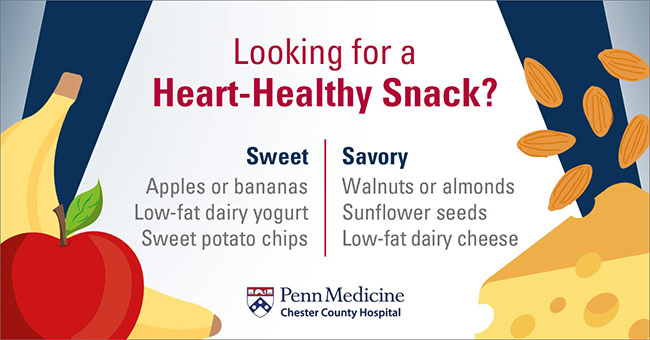
There are a lot of children who aren'T excited about school — especially when it comes to science. But for Maureen Boccella, MS, RD, CDECES, LDN, seventh-grade biology sparked her interest in nutrition, and her focus never shifted.
With a grandmother who was also an RN, healthcare and helping people runs in the family. Growing up surrounded by hundreds of fad diets, Maureen knew she wanted to study nutrition in college and provide the education that could actually help people live healthier lives.
At Chester County Hospital, Maureen is the Manager of Nutrition and Diabetes Services. This February during American Heart Month, Maureen shares how you can start a healthier diet and notes some of her favorite foods for heart health.
What's the Connection Between Diet and Heart Health?
When you think about what you eat, you may be wondering how that has any connection to your heart. Your health is all connected, and what you do for one part of the body can actually impact other parts of your body.
With your diet, some foods are just healthier for your heart than others. For example, some foods l-- ike beef and butter -- are high in saturated and trans fats. These kinds of fats can lead to an increase of cholesterol in your blood vessels and a build-up can cause health conditions like a heart attack.
"If someone said to me, 'What do I need to do to have a healthier lifestyle?', my answer is to look at your heart health and a heart-healthy diet," says Maureen. "If you eat healthier for your heart and go for a more plant-based diet, it's going to have a positive impact on your overall health."
Your body isn't just your heart or just your stomach. All of the different parts of your body work together and can have an impact on one another and on your overall health.
Heart-Healthy Foods to Try
If you have made a decision to focus on your heart health — there's no time like the present.
"The thing about your heart health is that it is rarely too late to make a difference," says Maureen. "Even after a diagnosis, you can still make a change and have a really positive impact on how you're feeling. You're also never too young to start thinking about your heart health. We see plaque formation even in adolescents and kids depending on their diet and their weight status, so it's never too soon to be more health conscious."
In general, to maintain a heart-healthy diet, you'll want to prioritize fruits, veggies and whole grains. You may not have to drastically change what you are eating, and you may be surprised how many foods you eat are already good for your heart!

Another factor to keep in mind when
making choices for your heart is where you are getting your protein. Some sources of protein -- like nuts, legumes and seafood -- are better for your heart. Unprocessed or lean meat can be a good option as well.
"One of my favorite heart-healthy foods goes along with the trend," says Maureen. "I love avocados. They're great for heart health because they have omega-3 fats. You can use avocados on whole wheat toast or an English muffin for breakfast. You can add it to a sandwich for lunch. You can add some to a bowl of chili. Avocados are very versatile."
It's Time to Start Eating for Your Heart
This February, take the first step towards better heart health. If you're not sure what that first step should be, Maureen offers three ways to start.
1. Connect with a Dietician
Working 1:1 with a dietician or nutritionist can help you get personalized guidance about your diet — and many people actually have a nutrition benefit through their insurance to cover this service.
Meeting with a registered dietician might seem nerve-wracking, especially if you have had bad experiences related to your diet or your weight. But dieticians can be a key part of reaching your health goals, focusing on positive changes instead of guilt around food.
"The real big take-home piece I want everyone to remember is you do not have to be perfect," explains Maureen. "You can still have fun with food, you can still have your birthday cake or holiday meal with your family. We're just trying to get people to eat a little bit better and think differently every day."
2. Try Something New
When you're starting your heart health journey, it might feel uncomfortable. If you've never tried avocado toast before, you might be hesitant. When you're changing things up in your diet, it's important to try different foods and recipes outside of your comfort zone.
But, while trying out new foods and recipes is great, it's important to be mindful of where you're getting your information.
"If you're going to go online to learn more about a heart-healthy diet, be very careful with the information you're reading," says Maureen. "Not all health advice on the internet is scientifically true — in fact, so much of it isn't."
Maureen wants to encourage people to learn more about their health and to make sure that they're getting information from reliable sources.
Some sites to learn about your heart health (and even find healthy recipes) are:
3. Attend a CCH Heart-Focused Event
To celebrate American Heart Month in February, Chester County Hospital will be hosting many free heart-related events. From cooking classes to health assessments, there is something for everyone.
These events are a great way to learn more about your heart — and how you can take better care of it. Whether you have recently been diagnosed with a heart condition or just want to eat better for your heart, Chester County Hospital and the registered dietitian team are here to help you every step of the way.
Want to Attend a Heart Health Event? Check out the Wellness Calendar, and register today!